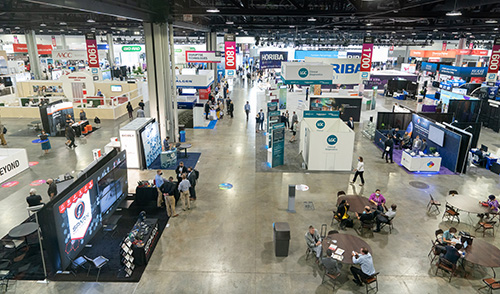
With 5 jam-packed days of plenary discussions, scientific presentations, networking events, and more, the AACC Annual Scientific Meeting and Clinical Lab Expo offers something for everyone. But there are some unique features to this meeting, members of the Annual Meeting Organizing Committee (AMOC) say, and it pays to prepare so you don’t miss anything.
“This meeting has its own culture,” said Daniel Holmes, MD, FRCPC, AMOC vice chair, clinical professor at the University of British Columbia, and department head of pathology and laboratory medicine at St. Paul’s Hospital, in Vancouver. “I went to the meetings for years before I clued in to what’s going on, because I didn’t have any mentorship as a resident about how this meeting works, and how to get the most out of it.”
Christina Lockwood, PhD, DABCC, DABMGG, AMOC vice chair and an associate professor and director of the Genetics and Solid Tumors Laboratory at the University of Washington, Seattle, agrees.
“It draws a ton of people from a lot of different backgrounds,” she said. “We have manufacturers, scientists, lab directors, trainees, clinical scientists, and more. In addition to the scientific content presented, there’s the expo and other opportunities for networking and learning.”
Newcomers should be aware of AACC University, Holmes said. These are ticketed 3- or 6-hour courses on various laboratory topics in a small-group format. This year’s courses will discuss subjects including autoantibody serology, instrument basics, and next-generation sequencing.
Another insider tip: look for the special session “How Low Is Too Low? Hemoglobin A1c Considerations in Diabetes Managementon” on Sunday, held before the opening plenary. “It’s basically a warm up for the opening plenary, and a topic of interest to everybody,” Holmes said. This year’s presentation will be led by journalist/author James Hirsch, and Irl Hirsch, MD, MACP, of the University of Washington Medicine Diabetes Institute.
After the opening plenary, make sure to attend the opening mixer, Holmes advised. It’s a great way to network with colleagues over food and drinks, he said, but in addition, AACC divisions of individuals interested in particular topics such as pediatrics, endocrinology, mass spectrometry, etc., have tables where attendees can learn more and find out about events within each division.
Also be on the lookout for roundtable discussions at lunchtime, said Holmes. For a small fee, attendees can have brief discussions with an expert on a special topic and enjoy face-to-face conversation and quality networking.
To best plan your meeting days, review the schedule carefully online or through the meeting app, as there are multiple events occurring simultaneously, Holmes said. The app can be used to search for sessions by name, track, or date, Lockwood said. Handouts for individual sessions can be downloaded and reviewed ahead of the presentations. In addition to the browsing the auxiliary events online, another way to track events is to check the Artery, AACC’s online community, Lockwood said.
Lockwood offered some additional suggestions: “Go to your local section and attend your scientific division activities. Also, plan to go to the Expo and see the vendors who supply your laboratory and get more information about what’s coming up next. This is a really outstanding opportunity to see what companies are doing, and what they’re planning for the future.”
Make sure to get a little bit outside of your comfort zone, she added. “Maybe that means scientifically, going to a new session, going to talk to a vendor, or going to a networking opportunity for a new area or your local section. It’s amazing what opportunities can come from even just a chance meeting that you have with someone.”
Even if it’s your first meeting, don’t feel alone, Lockwood emphasized. If you have questions, reach out to AMOC members, who will be wearing special ribbons on their badges, or AACC staff. If you miss a session, don’t fret as they are all recorded, Holmes said. Lastly, be sure to keep track of the sessions you attend so you can get your CME credits, he said.
Karen Blum is a freelance medical and science writer who lives in Owings Mills, Maryland. +Email: [email protected]